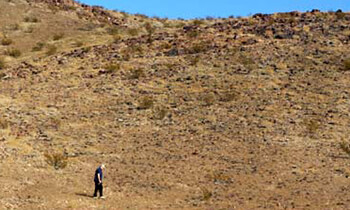Jumping Cholla
Chain Fruit Cholla - Opuntia fulgida
Cholla is a term applied to various shrubby cacti with segmented branches. The "jumping cholla", Opuntia fulgida, is a very spiny cactus, usually a shrub, but sometimes more like a tree, with a number of irregular, jointed branches bearing sharp-barbed spines that are painful and difficult to remove. Because the cholla's 3- to 8-inch joints separate easily, they appear sometimes to "jump" to attack passersby. Also called the "chain fruit cholla" this variety grows to a height of 6 to 15 feet and a diameter of up to 8 feet. It is the largest of the cholla; other cholla specimens are usually much smaller.
The somewhat drooping branches bear light-green, 1/2- to 1-inch leaves only when young. Clusters of green, spineless, pear-shaped fruit about an inch in length hang in chains from the branches. Some remain attached for several years, bearing new flowers annually, sometimes with no seeds. New fruits are added to those from previous seasons, creating a chain of spineless fruit up to 2 feet long -- hence the name "chain fruit."
In times of drought, deer and bighorn sheep have traditionally relied on this juicy fruit as a source of food and water. These days, cattle often rely on it for the same reasons, sometimes growing fond enough of this desert delicacy to ignore the sharp barbs of its jointed branches, even in moister times.

The teddy bear cholla (Opuntia bigelovi) is also referred to as "jumping cholla" by many. It can be distinguished by its dense, straw-colored spines and yellow to green flowers.
Range
Sonoran Desert of central and south Arizona and northwest Mexico to an elevation of 4,000 feet.
Habitat
Dry, sandy soils of bajadas, valleys, plains and slopes.
Flowers
Scattered at the end of branches and on fruit, flowers bloom in March and April. They are about 1 inch long with 5 to 8 white and pink petals streaked with lavender.
Fruit
Green, spineless, pear-shaped berries grow on the edge of pads. Fruit is 1 1/2 inches long and half as wide and has many seeds. Some remains attached for several years and bear new flowers and fruit annually. Such fruit clusters will hand in long, branched chains
-- A.R Royo
Photo tips: Most digital point-and-shoot cameras have a macro function - usually symbolized by the icon of a little flower. When you turn on that function, you allow your camera to get closer to the subject, looking into a flower for example. Or getting up close and personal with a bug. More on desert photography.
Share this page on Facebook:
The Desert Environment
The North American Deserts
Desert Geological Terms







